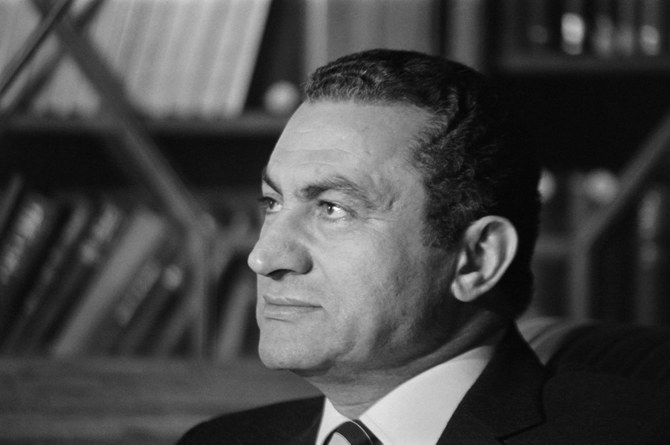
- ARAB NEWS
- 01 Jul 2025

The death of former President Hosni Mubarak in a Cairo hospital at the age of 91 this week marks the end of an era in Egyptian political life. His rule lasted for 30 years until his ouster in February 2011. Mubarak led Egypt at a time of great regional upheavals and, to his credit, he was able to safeguard Egypt’s interests while preserving his country’s leadership role in the Arab world.
While he maintained the foreign policy course of his predecessor, Anwar Sadat, he also oversaw Egypt’s largest economic recovery since a military coup ended the monarchy in 1952. Under his leadership, Egypt was able to rid itself of militant Islamist groups in the late 1980s and early 1990s. Mubarak continued Egypt’s pivot toward the US, which began with the signing of the Camp David peace treaty in 1979, and he became one of Washington’s most trusted regional allies.
He was able to launch Egypt’s slow transformation from socialism to free market capitalism while maintaining a semblance of social justice by subsiding bread, fuel and essential services to help the poor. But he could not do away with the bulging bureaucracy that continues to plague the economy. The state continued to compete with the private sector through ownership of major companies in various economic sectors.
Succeeding Sadat, who was assassinated while attending a military parade in 1981, Mubarak brought hope and healing to a scarred nation. During his long reign, Mubarak took modest steps toward democratic reforms. He won every re-election round virtually unopposed. The ruling National Democratic Party that he headed from 1981 until his departure — the party was later dissolved — became a fixture of Egyptian politics with hardly any opposition. And his one-man authoritarian rule came at the expense of political freedoms. It led to mass corruption, cronyism, and rises in poverty, unemployment and police repression. By opposing the Muslim Brotherhood, he allowed rival movements to operate freely, thus pushing society into becoming more religious and conservative.
Under Mubarak, the rich got richer while the poor suffered. A new class of the rich and powerful allied itself with Mubarak, who kept his generals happy by showering them with key appointments and multimillion-dollar commercial projects. This clique became the backbone of his ironclad rule and was probably the main trigger for the Jan. 25 uprising that finally brought him down.
That uprising, driven mostly by young and disenfranchised Egyptians, became the main episode of the so-called Arab Spring. It came at a time when Mubarak was pushing to have his son Gamal succeed him. He was so disconnected from reality that his efforts to reconcile with millions of protesters were too little, too late.
He believed in security and stability as fundamentals in the survival of Egypt, and he looked at himself as the guarantor of both
Osama Al-Sharif
He was later sentenced on a number of charges, including the murder of 800 people during the 18 days of protests. His trials — as he lay on a hospital gurney inside a cage in court — mesmerized Egyptians, many of whom had known no other leader. That image became the most daunting for Egyptians and Arabs as the Arab Spring spiraled into chaos in Libya and Syria.
Mubarak and his sons were finally acquitted by the new government led by Abdel Fattah El-Sisi. Mubarak spent his final days in his posh Heliopolis villa.
Ironically, Mubarak had some satisfaction as more Egyptians came forward to ask for his forgiveness. Compared to the present regime, Mubarak represented the good old days; of moderate openness and freedom of expression, and better economic conditions.
With the state announcing a three-day mourning period and on Wednesday holding a military funeral in his honor, as one of the 1973 war heroes, Mubarak’s legacy is now with his compatriots. Today, Egypt finds itself facing multifaceted challenges and some Egyptians are wondering how Mubarak would have dealt with the dangers posed by the Grand Ethiopian Renaissance Dam that threatens the country’s lifeline, the Nile, the Turkish incursion in neighboring Libya, and the fight against Daesh in Sinai. If anything, Mubarak’s Egypt stood high and mighty in the region and beyond.
Also to his credit, Mubarak never visited Israel and he was a major backer of a negotiated settlement between Israel and the Palestinians on the basis of a two-state solution. On his watch, Egypt enjoyed wide global respect. His fascination with Sharm El-Sheikh made the Red Sea spot one of the world’s primary resorts and a major attraction in the country’s thriving tourism industry.
History may not be harsh on Mubarak after all. The Arab Spring failed to bring in democracy, freedom and social justice. The region remains hostage to turmoil and instability. There are Egyptians who still yearn for the Mubarak days. He believed in security and stability as fundamentals in the survival of Egypt, and he looked at himself as the guarantor of both. Ultimately a new generation of Egyptians wanted much more. He failed to take notice and was finally denied the legacy he wanted.